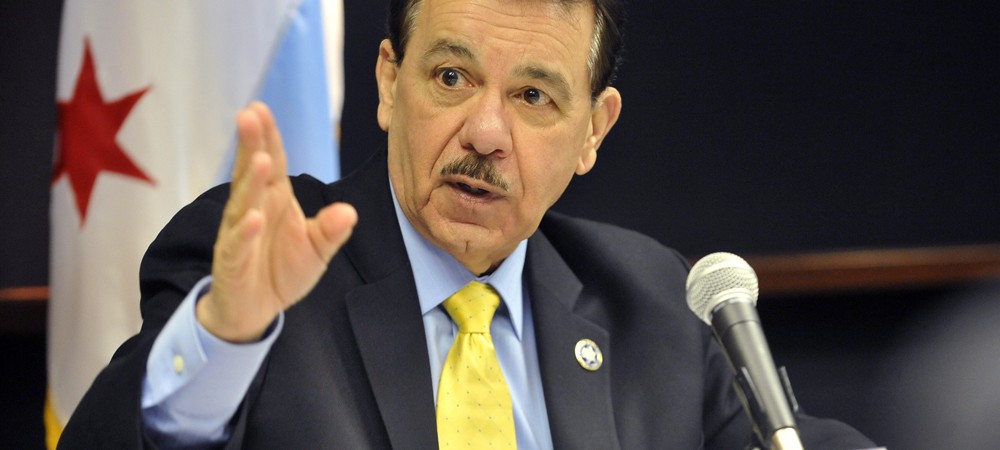
Illinois State Police director Hiram Grau. I Sun-Times library
Case was too hot for Quinn’s top cop
Published March 9, 2014
By CHRIS FUSCO AND TIM NOVAK
Staff Reporters
Less than a month after the Chicago Police Department closed the David Koschman case without charging then-Mayor Richard M. Daley’s nephew, Cook County State’s Attorney Anita Alvarez decided someone needed to come in to do an “independent investigation . . . to ensure we reach the truth in this case.”
Alvarez — who was feeling heat over her office’s handling of the case — got the Illinois State Police to take it. Less than two weeks later, though, the state agency abruptly backed out.
Newly obtained documents show why: In the interim, the incoming Illinois State Police director hand-delivered a letter to Gov. Pat Quinn saying he had conflicts of interest involving the Koschman investigation and recommending the case be turned over to the FBI.
“As you know, the Illinois State Police has accepted the call to conduct an independent review of the investigation of the death of David Koschman, initially investigated by two of my former employers, the Chicago Police Department and the Cook County state’s attorney,” Hiram Grau wrote in his March 28, 2011, letter to Quinn.
At the time of Koschman’s death in 2004, Grau was the police department’s deputy superintendent of the Bureau of Investigative Services, which had oversight of the case involving Daley nephew Richard J. “R.J.” Vanecko. After leaving the department, Grau became Alvarez’s deputy chief of investigations — the job he was leaving to run the state police.
“Given my impending appointment as director of ISP, ISP must decline to conduct [the Koschman] review,” Grau wrote. “A review of this matter by ISP during a time when I am director would lead to questions, fair or not, about the integrity of the review.
“More than that, a mother has lost her son, and she deserves answers as to whether the investigation was handled properly, answers that she can trust. I fear that the appearance of a conflict of interest would deprive Mrs. [Nanci] Koschman of the small peace of mind that an objective review might provide.
“I therefore am requesting that the ISP immediately cease review of the matter. It is my belief that . . . Alvarez should request a complete review of this matter by the Federal Bureau of Investigation.”
There’s no indication Grau ever made that suggestion to Alvarez. He told investigators he never talked with her about the Koschman case, according to the 162-page report on the case by Dan K. Webb, the special prosecutor whose investigation led Vanecko to plead guilty Jan. 31 to involuntary manslaughter, admitting he threw the punch that killed Koschman. Vanecko, 39, is now serving a 60-day jail sentence.
Neither Grau nor Alvarez will comment.
“We knew nothing of the letter that Hiram Grau had drafted to the governor until the Webb report was published,” Alvarez spokeswoman Sally Daly says. “We have never seen the letter and knew nothing of its recommendations. The state’s attorney never spoke to Hiram Grau regarding the Koschman case, and he never participated in any internal office discussions about the case.”
Dan Kirk, Alvarez’s chief of staff, told Webb’s investigators the state’s attorney’s office considered handing the case to the FBI but determined the federal agency “lacked the necessary jurisdiction.”
On March 24, 2011, Alvarez asked the state police to review the Chicago Police Department’s investigation after a series of Chicago Sun-Times reports cast doubt on the way the investigation was handled and revealed that witnesses disputed statements detectives said they’d made describing Koschman as physically aggressive.
The state agency agreed to do the review on March 25, 2011 — the same day Quinn announced Grau’s appointment.
Also that day, Jessica Trame, chief of staff to Patrick Keen, the interim director of the Illinois State Police, emailed three state police staffers: “The governor’s office has made the decision that we will be re-investigating this death. Director Keen has spoken w SA Alvarez, and she is fedexing the case file to this office.”
Three days later, Grau delivered his letter — written on Cook County state’s attorney’s office stationery — to Quinn.
The state police stepped aside on April 4, 2011. Keen cited his department’s lack of subpoena power and said it was “not the appropriate entity to conduct the requested review.”
Alvarez then decided to conduct her own investigation with the help of city of Chicago Inspector General Joseph Ferguson.
About nine months later, questioning Alvarez’s ability to conduct an impartial investigation, Nanci Koschman asked a judge to appoint a special prosecutor to re-investigate her son’s death and the way the case was handled by police and prosecutors.
Alvarez fought that request, but Cook County Circuit Judge Michael P. Toomin appointed former U.S. Attorney Webb as special prosecutor. Ferguson’s staff then worked with Webb.
Webb concluded that police officers fabricated statements to support an erroneous conclusion that Vanekco punched Koschman in self-defense. Last June, Webb turned over his evidence to four FBI agents he said specialize in police corruption cases.
Webb’s investigators questioned Grau about the letter on Dec. 19, 2012, according to the special prosecutor’s report.
In 2004, when Koschman was killed, Grau oversaw the Chicago Police Department’s detective division, reporting to Supt. Phil Cline.
Grau’s chief of detectives, James Molloy, told Webb’s investigators that “while he did not discuss the case with Grau, he recalled leaving a copy of the detectives’ police report ‘detailing what [went] on the night of the lineup’ in a sealed envelope for Grau.”
Webb wrote that, when questioned, “Grau stated he did not recall receiving a report from Molloy and indicated he had no involvement in the Koschman case.”


